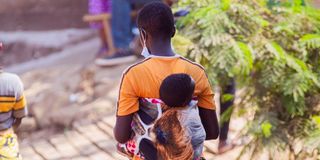Why West Pokot is struggling to tame teen pregnancies

A teenage mother with her baby. Poverty, retrogressive cultural practices and illiteracy have been cited as major contributors to the high rate of teenage pregnancies in West Pokot.
What you need to know:
- West Pokot is second in teenage pregnancies at 36 per cent, out of the 47 counties, according to the Kenya Demographic and Health Survey 2022 report.
- The pregnancies pose serious health, psychosocial and economic hazards, rendering many girls rejects in their families.
Poverty, retrogressive cultural practices and illiteracy have been cited as major contributors to the high rate of teenage pregnancies in West Pokot.
Despite efforts by different education and child protection stakeholders to find solutions, many schoolgirls are victims and this hurts their education.
With an illiteracy level of 67 per cent and a poverty level of 57.3 per cent, West Pokot is second in teenage pregnancies at 36 per cent, out of the 47 counties, according to the Kenya Demographic and Health Survey 2022 report. It was 29 per cent in 2014.
It has been established that teenage pregnancies pose serious health, psychosocial and economic hazards, rendering many girls outcasts as they drop out of school.
“Many people believe girls from poor families engage in transactional sex to meet basic needs. Others blame absentee parents or lack of parental guidance and exposure to information on the Internet – both of which can lead to curiosity, hence teenage pregnancy.
“Yet, others even say these girls are ‘mature minors’ who consented to sex. The problem is attributed to some people taking advantage of the girls’ innocence,” says Pokot Girl Child Network coordinator Teresa Lokichu.
Also read: West Pokot turns to mentorship in war on FGM, child marriage
Ms Lokichu says the many cases are linked to low awareness of sexual and reproductive health matters among adolescents and young people, as well as rampant retrogressive cultural practices like female genital mutilation (FGM) and child marriage.
“Pregnancy happening at a young age, during adolescence, has adverse effects on girls or young women. This is why it is important to find ways of preventing these cases and offering support to those already pregnant,” she notes
Ms Lokichu points out that pregnant adolescents also face negative social consequences that prompt them to leave school, thus reducing their employability and leading to long-term economic implications.
Declares Kenya Organisation director Jefferson Mudaki says the worrying trend undermines girls’ education, with early pregnancies leading to a rise in poverty and illiteracy levels. “Girls aged between 12 and 18 are the most affected as they drop out of school even before they get to class eight.”
Peer and socioeconomic pressure
Mr Mudaki also cites peer and socioeconomic pressure. “It is also time to acknowledge that we have many cases of defilement leading to pregnancies that society looks at as ‘the girl consented to sex.’ All cases need to be investigated where the girl in question is a minor.”
He says sex education should be taught to reduce teenage pregnancies.
“As a society, we all have a role to play to change this trend. It is time we strongly supported age-appropriate sex education at all levels: in families, schools, and even places of worship.
"By providing comprehensive sex education, youth-friendly services, and accessible and quality reproductive health services, we can ensure girls plan their lives and make informed decisions for their futures,” Mr Mudaki says.
World Vision Child Protection officer Teresa Cheptoo says cultural practices hamper access to contraceptives. She explained that low literacy makes the girls have limited exposure to contraceptives.
“Teenagers may not seek family planning services like the older women do. Their age does not allow them to; however, due to the fact the issue has escalated, they are not used.”
Also read: West Pokot girls now 'face the cut as gospel songs rend the air' in cover-up
Ms Cheptoo notes that adolescent girls from poor families often have to make trade-offs between health and economic security. “This leads to staying in abusive relationships, intergenerational relationships and multiple partners.”
She adds that such girls are vulnerable to sexual exploitation. “Girls from poor socioeconomic backgrounds will most likely be involved in early intimacy affairs. They are also dropping out of school, affecting their reproductive health including child birth, and overall limiting their capabilities, opportunities and choices. A common psychosocial effect is trauma.”
“These girls are easily lured into the arms of men who are ready to offer them cash and/or in kind for sex. Some parents encourage their teenagers to go out and bring money for basic survival,” she says, adding the situation is worse where mothers themselves were survivors of teenage pregnancies.
She cites famine and limited access to basic needs, particularly in areas in northern and central areas of the expansive county, which have many challenges, as the reasons for the vulnerability.
“Some parents are jobless and the teenage girls have to seek financial support as a coping strategy. Men take advantage of girls from poor families by demanding sexual favours in exchange for money and food.
“The inability to get basic needs or to attend school exposes them. They have no option other than dropping out of school, getting married or engaging in commercial sex to uplift the welfare of their families,” she says.
She says that in major towns like Kapenguria, young girls work as sex workers, or “sex entertainers” to earn a living.
“Populations have limited opportunities and choices, which predispose young girls to be lured into sexual activity for purposes of accessing basic necessities. Community taboos and traditions where sex is not openly discussed lead to increased teenage pregnancies in pastoral areas," Ms Cheptoo says.





